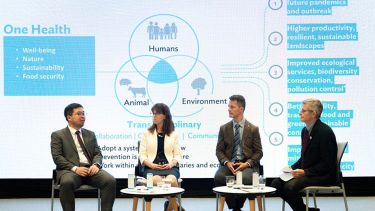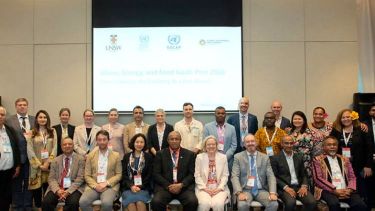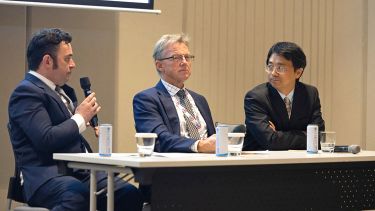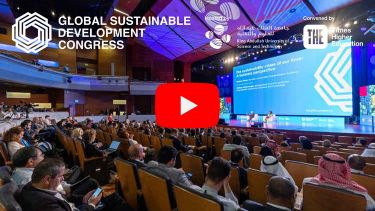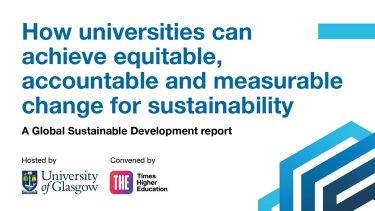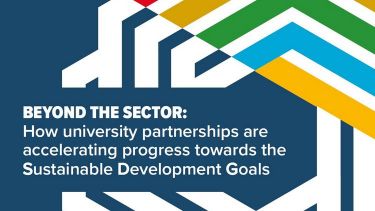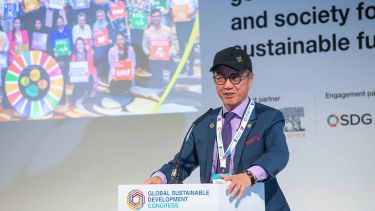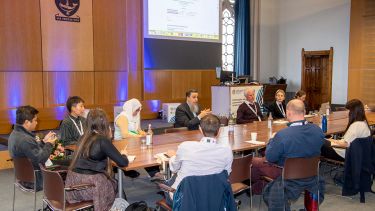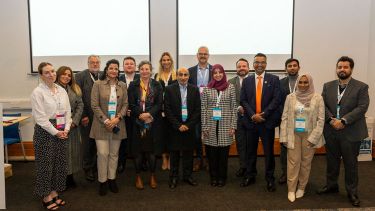With the first edition having taken place in Glasgow and the second in Thuwal, Times Higher Education’s third edition of the Global Sustainable Development Congress took place in Bangkok on 10-13 June 2024 and was co-hosted with Thailand’s Ministry of Higher Education, Science, Research and Innovation.
The event convened more than 3,000 world-leading thinkers, innovators and policymakers from over 1,000 universities, governments, businesses and organisations to develop urgent solutions to the sustainability emergency.
It provided calls to action for universities to pivot their educational, research, innovation and outreach programmes towards delivering the United Nations’ Sustainable Development Goals (SDGs) and join forces with businesses, governments and charities to deliver results. Phil Baty, chief global affairs officer at THE, said that universities must “turn research, teaching, innovation and ideas into action”.
Over four days, more than 360 keynote speakers, panellists and partner representatives shared their expert insights on sustainable development in over 160 sessions based on six core themes:
- Digital revolution for sustainable development
- Education, gender and inequality
- Energy decarbonisation and sustainable industry
- Health, well-being and demography
- Sustainable cities and communities
- Sustainable food, land, water and oceans
A key takeaway was the recognition of the complexity and need for collective action through collaboration and cross-sector initiatives. Dawn Freshwater, vice-chancellor and professor at the University of Auckland, said: “We have to recognise that we aren’t always going to be the people leading the conversation. We can convene the conversation, but a bit of humble pie wouldn’t go amiss – we won’t always be the ones leading.”
Antara Ganguli, director of the UN Girls’ Education Initiative, said: “What is really valuable about this is that it’s bringing together people and thinkers and policymakers and actors from different sectors. I would love it if all of us went home thinking something that we hadn’t thought before.”
Speakers comprised of higher education leaders, senior policymakers, inspirational changemakers and sustainability business chiefs, with key names including:
- Antara Ganguli, director, UN Girls’ Education Initiative
- Puleng LenkaBula, vice-chancellor and principal, University of South Africa (Unisa)
- Nik Nazmi bin Nik Ahmad, minister of natural resources and environmental sustainability, government of Malaysia
- Alan Chan, provost and professor of Chinese culture, Chinese University of Hong Kong (CUHK)
- Jason Blackstock, founder and CEO, How to Change the World
- Sanjana Chhantyal, project lead, Sustainable Development Solutions Network Youth
- Bicky Bhangu, regional president, Rolls-Royce Singapore
- Chetser Chua, head of government affairs and public policy, Google Cloud
The congress highlighted initiatives to drive societal change through education, research and innovation, and delegates departed full of optimism and a shared commitment to accelerate progress towards the SDGs. CUHK’s Professor Chan said: “I’ve always believed that when good people come together, good things happen. There is hope, with hope we can grow in confidence.”
This sentiment was echoed by Unisa’s Professor LenkaBula, who said that “we must never be limited by the challenges and we must activate hope”.
Featured events within the congress included:
- Global Sustainability Leaders’ Summit, a gathering of global leaders to address the most pressing challenges in progressing the 17 SDGs
- International Green Skills Summit, a chance for representatives to explore the opportunities and challenges of fostering green skills
- Business School Showcase, an opportunity for changemakers and thought leaders to explore business education
- DataLabs, a series of THE-led workshops, demos, masterclasses, case studies and consultancy sessions to empower sustainability in higher education through data, expert analysis and global best practice
In addition, the THE Impact Rankings 2024 were exclusively revealed at the congress, with Western Sydney University taking the top place for the third year in a row. The ranking, now in its sixth year, is the only global performance table that assesses universities against the SDGs and shows the positive impact that the university sector is having on the world’s progress towards the SDGs. Explore the rankings’ results here and methodology here.
Kevin Dunn, provost of Western Sydney University said: “We’ve got to save this planet, and universities have an important role: the thought leadership, the research that we undertake and the teaching of young minds. But, more than that, if we’re going to do those things, we have to role-model it ourselves. We have to be sustainable. That’s the way we’re going to save this planet; that’s the way we’re going to have more inclusive and diverse societies that are harmonious.”
The congress provided a chance to listen to and meet global experts, thought leaders and policymakers on sustainable development with more than 15 hours of networking and cross-sector collaboration built into the agenda. Delegates from 87 countries benefited from access to case studies, heard about best practices and learnt about successful models and innovative strategies through the impactful projects showcased in the exhibition hall.
Watch the session recordings on-demand.
View the event photo in our Flickr album.
Watch the highlights and closing videos:
The next and fourth edition of the congress will be taking place on 16-19 June 2025 in Istanbul, Turkey, and will be co-hosted with Turkey’s Council of Higher Education. Find out more via the 2025 website here.




